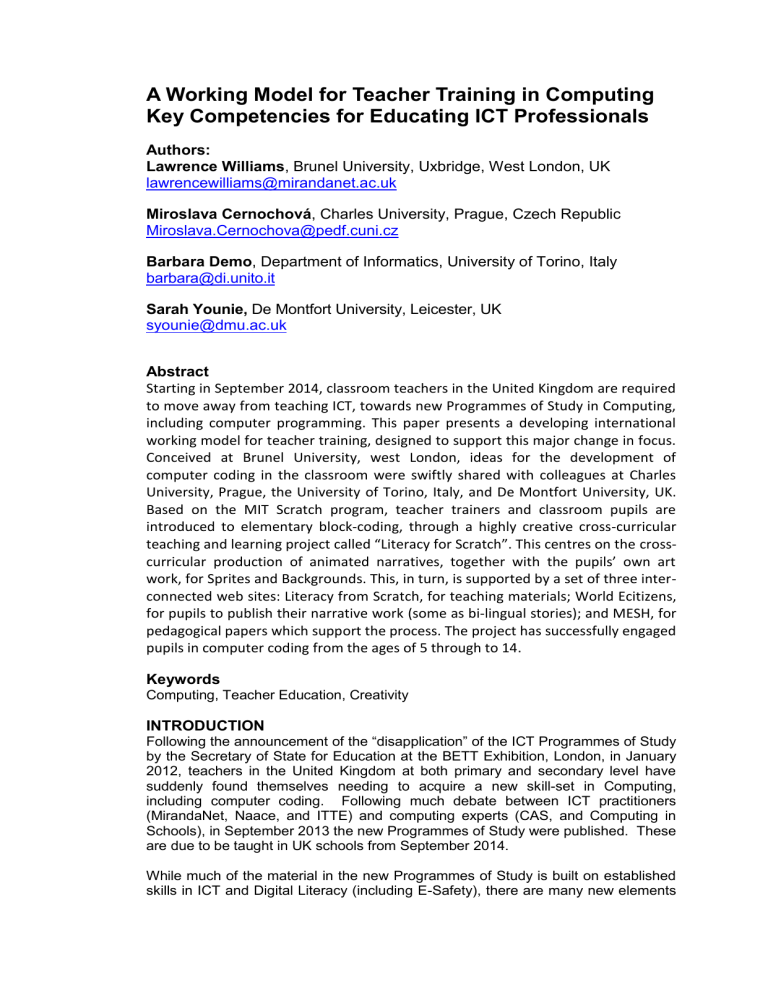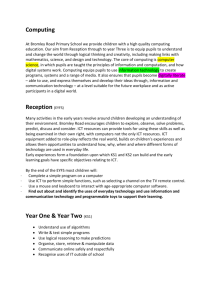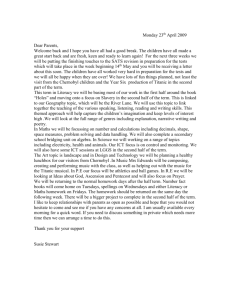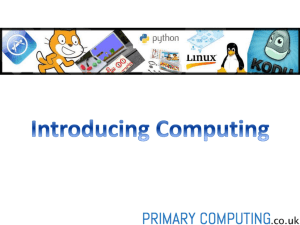A Working Model for Teacher Training in Computing

A Working Model for Teacher Training in Computing
Key Competencies for Educating ICT Professionals
Authors:
Lawrence Williams , Brunel University, Uxbridge, West London, UK lawrencewilliams@mirandanet.ac.uk
Miroslava Cernochov á , Charles University, Prague, Czech Republic
Miroslava.Cernochova@pedf.cuni.cz
Barbara Demo , Department of Informatics, University of Torino, Italy barbara@di.unito.it
Sarah Younie, De Montfort University, Leicester, UK syounie@dmu.ac.uk
Abstract
Starting in September 2014, classroom teachers in the United Kingdom are required to move away from teaching ICT, towards new Programmes of Study in Computing, including computer programming. This paper presents a developing international working model for teacher training, designed to support this major change in focus.
Conceived at Brunel University, west London, ideas for the development of computer coding in the classroom were swiftly shared with colleagues at Charles
University, Prague, the University of Torino, Italy, and De Montfort University, UK.
Based on the MIT Scratch program, teacher trainers and classroom pupils are introduced to elementary block-coding, through a highly creative cross-curricular teaching and learning project called “Literacy for Scratch”. This centres on the crosscurricular production of animated narratives, together with the pupils’ own art work, for Sprites and Backgrounds. This, in turn, is supported by a set of three interconnected web sites: Literacy from Scratch, for teaching materials; World Ecitizens, for pupils to publish their narrative work (some as bi-lingual stories); and MESH, for pedagogical papers which support the process. The project has successfully engaged pupils in computer coding from the ages of 5 through to 14.
Keywords
Computing, Teacher Education, Creativity
INTRODUCTION
Following the announcement of the “disapplication” of the ICT Programmes of Study by the Secretary of State for Education at the BETT Exhibition, London, in January
2012, teachers in the United Kingdom at both primary and secondary level have suddenly found themselves needing to acquire a new skill-set in Computing, including computer coding. Following much debate between ICT practitioners
(MirandaNet, Naace, and ITTE) and computing experts (CAS, and Computing in
Schools), in September 2013 the new Programmes of Study were published. These are due to be taught in UK schools from September 2014.
While much of the material in the new Programmes of Study is built on established skills in ICT and Digital Literacy (including E-Safety), there are many new elements
to be learnt by classroom teachers, and teacher trainees. The Computing project described here , “Literacy from Scratch”, has an associated web site, on which there are extensive, free, support materials for teachers, together with examples of pupils’ work from the ages of 5 up to 16. Developed by Lawrence Williams, the web site details the progress of a creative classroom approach to computer coding skills, using the MIT visual programming language, Scratch. The most important aspect of this web site is that teachers can download completed Scratch project work by students, and by teachers, and they can analyse the actual coding, in a way that other Scratch projects on the web do not allow. Analysing and deconstructing successful coding has been found to be the most efficient way of developing and understanding the computer coding aspects of computational thinking.
See: www.literacyfromscratch.org.uk
or Google: Literacy from Scratch
DISCUSSION
The UK Perspective
At Brunel University, it concerned me that while there were many lively Scratch projects posted by young students on the web, there seemed to be little teacher guidance in developing educational projects to their full potential. The creation of increasingly complex narrative, by using Scratch, is an obvious way forward, as it develops Computing skills alongside creative writing, including bi-lingual stories, art, and music.
“Literacy from Scratch” is a response, therefore, to the United Kingdom government’s initiative to develop computer programming skills (formerly Computer
Science, now called Computing) in both the Primary phase of education (pupils aged 5 to 11) and the Secondary phase (aged 11 to 18). The project has several related aspects: it involves the reworking of Primary and Secondary Initial Teacher
Education (ITE) programmes at Brunel University, through which Postgraduate students are taught how to use the MIT Scratch programming language, to create sustained and animated narrative work. This work was developed by a whole year group (187 Year 8 pupils aged 12 -13) at a local London secondary school. Support materials for creating these illustrated and animated narratives were developed at both institutions (the Bishop Ramsey School, and Brunel University), and were sent by email to a school in Prague, Czech Republic where, with the assistance of both the teaching staff and student teachers at the Faculty of Education in the Charles
University in Prague, a local Prague Basic School undertook the same project, with several groups totalling 45 Year 3 to 7 pupils (aged 8 – 13). “Literacy from Scratch” is also, therefore, a response to the existing situation regarding the provision of ICT education in the Czech curriculum for Primary Education
The Czech Perspective
As part, therefore, of a recent Brunel – Charles University Erasmus agreement, and in harmony with the Brunel working model, the Charles University, Faculty of
Education in Prague ICT teacher trainers decided to adopt, and adapt, the teaching approach to Computing education, and to develop profound links between ICT education and Art education, using the “Literacy from Scratch” model.
The Czech Republic is one of the EU countries which implemented ICT as a compulsory education area (subject) into a curriculum for Primary education (aged in 6 to 11) and Lower Secondary School (aged in 11 to 15). In Primary Education the ICT curriculum is concentrated on three main topics: Introduction into work with a computer , Searching information and communication , and Information processing and utilization . ICT education for lower secondary education is focused on two topics: Searching information and communication , and Information processing and
utilization . ICT concepts and ICT user skills development predominate in the curriculum. There is no demand to develop concepts and knowledge from informatics/computer science. It depends on conditions in schools, on school management, and on ICT teacher professionalism how in reality ICT teaching is designed. The textbooks for ICT subjects are unavailable.. The Ministry of Education of the Czec h Republic doesn’t coordinate the situation related to textbook publishing, and so some teachers write textbooks themselves.
The Faculty of Education in Prague educates, among others, ICT (ITT) teachers who will specialise in schools in the teaching of compulsory ICT Education. The MA degree study in ICT teacher education is focused mainly on pedagogical aspects of
ICT education. In the final semester, ICT (ITT) teachers are given an opportunity to manage a complex project in schools, based on a close collaboration with teachers, and to explore links across the Primary curriculum. Therefore, the idea of “Literacy from Scratch” could be implemented at the Faculty of Education to great advantage.
An ICT (ITT) teacher decided to participate in the “Literacy from Scratch” project, designed by Lawrence Williams at Brunel University, and realised it at ZS
Korunovacni. He introduced its main idea to the school management and teachers.
He organised a seminar for ICT teachers about programming in Scratch in order to create animated narratives.
The project contributes to developing interdisciplinary (or cross-curricular) relations between Czech/English language and literacy (narrative stories), CS Education
(development of algorithmic thinking) and Art Education (design of Sprites,
Background, and four sequences of a story). It fits very well with the education for pupils Year 3 to 7 (age 8 to 13). ICT teachers incorporate its idea into the school curriculum, in accordance with a methodology concerning how to develop key competencies, and both computer literacy and language literacy. The link between the university and the Korunovacni School continues this year through the diploma course.
In addition, the more artistic, rather than literary, approach to story-telling adopted at the Korunovacni School has fed back into the Key Stage 1 curriculum work (for pupils aged 5 to 7 years) undertaken in London. An important part of the second year of the project, has involved Scratch stories being developed by 5 and 6 year old pupils, but with much more emphasis on creating their own Sprites and
Backgrounds for the stories, following the Czech developments of the model.
The project, thus far, was presented at the WCCE Conference in Poland in July
2013 where the creative aspects of the project were noted by Dr. Barbara Demo, from the Informatics Department at the University of Torino, Italy.
The Italian Perspective
The international collaboration between the university departments in Torino, Italy, and Brunel, United Kingdom centres on the development of the project “Literacy from Scratch”. The project was first designed in the UK to engage pupils in valid computer programming work, at an elementary stage, through creative story-telling.
In Italy, the compelling problem with respect to Informatics in schools is in-service teacher training. Accordingly, an international workshop was arranged in Torino, in order to explore how the project might be developed. The pedagogical methodology characterizing the project is based on a set of training sessions allowing a gradual approach to both programming and the basic principles of computing. Narrative work produced using Scratch has proved to be quite appealing for users, and the development of the project in local primary and secondary schools in Torino, with the
work supported by the Informatics Department of Torino University, has been very successful. Outcomes are posted on the linked web sites: www.literacyfromscratch.org.uk
and http://t4t.di.unito.it/ (following T4T-2013, virtual environment Moodle).
MESH – a global perspective
A further development has been through the MESH initiative. See: http://www.meshguides.org/about-mesh/#how-mesh-operates
MESH - Mapping and Managing Educational Specialist Knowhow is an educational knowledge management system with the aim of underpinning professional judgment with evidence. MESH uses an accessible multimedia mindmap approach to present a diagrammatic database of subject-specific research-based knowledge about the teaching and learning of topics across the curricular disciplines. MESH builds upon existing portals and evidence bases for education, with the aim of summarising and making accessible the existing evidence whilst also documenting gaps in knowledge and mapping points of contention. The approach is inspired by the resources available to professionals and academics in other disciplines such as health, but recognises the challenges that education has as ‘a discipline across disciplines’. Wikipedia provides an example of how easily searchable a large database can be and that, over time, and through collaborative effort to pool knowledge, a high quality result may be achieved. The Map of
Medicine Healthguides is also a well-developed example of software which supports mapping professional knowledge.
Much research-based knowledge is currently buried in theses, held by individual academics and teachers or published in academic journals and reports, which are not easily accessible to teachers. MESH provides a way for teachers to access this knowledge, so that it can be leveraged to improve student outcomes. MESH provides the e-infrastructure to support worldwide collaborative work between those who want to strengthen the educational evidence base and support teaching becoming a strongly evidence-based profession.
Developing research-informed practice is a challenge for educators, not least because published educational research is rarely focused on the knowledge teachers need to improve educational outcomes. MESH is being developed by a world-wide network of educators who want to make this happen. It is currently being developed at Bedfordshire University to support Literacy from Scratch as part of a coherent approach to teaching and learning using Scratch for cross-curricular work.
The present writers all see the collaboration between the various countries involved in developing this whole new model as a vital step in providing support for teachers who are setting out to promote effective, meaningful and, above all, engaging lessons in Computing.
CONCLUSION
The Literacy from Scratch web site provides creative Computing materials for teachers of pupils aged 5 years to 14 years.
World Ecitizens provides an opportunity for pupils to publish and share their creative learning outcomes in Computing.
MESH provides the pedagogical underpinnings for the project, with papers published and categorised, for easy access and use by teachers.
In London, Primary teachers are being trained to develop their own skills in
Computing, ready to introduce this into their classrooms, by September
2014. This includes the creation of increasingly complex Branching Stories, and interactive resources for their classrooms.
In Prague, developments are under way, to continue widening the artistic and computing aspects of the project.
In Torino, teachers are being supported in developing creative, collaborative, and cross-curricular approaches to their training needs in Computing.
Much remains to be done, but this learning model has begun very successfully.
Biographies
Lawrence Williams teaches in the Graduate School at Brunel
University, in west London, following 40 years’ working in south
London secondary schools. His interests are in literacy, creative uses of ICT, cross-curricular learning, and in international collaborations, on which he has lectured and published widely.
Miroslava Černochová works for the Faculty of Education at
Charles University in Prague at the Department of Information
Technology and Technical Education, where she is responsible for courses focused on Pedagogy of ICT in Education, Teaching practice of ICT student teachers, and on Teaching of ICT as a compulsory educational area for Primary and Secondary
Schools.
G. Barbara Demo is Associate Professor at the Department of
Informatics of the University of Torino, Italy. Since the early ‘90s she has been active in introducing computing science in K-12 education, where she recommended the use of Logo, “unplugged” experiences, educational robotics and, more recently, open access to open data.
Sarah Younie is MA Programme Leader and Principal Lecturer in
Education Studies at De Montfort University, Leicester, UK. She teaches on the MA and BA programmes, and supervises research students in educational technology, innovation, pedagogy, professional development and management of change.
Copyright
This work is licensed under a Creative Commons Attribution-NonCommercial-
NoDerivs 3.0 Unported License. To view a copy of this licence, visit http://creativecommons.org/licenses/by-nc-nd/3.0/







